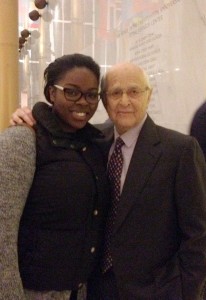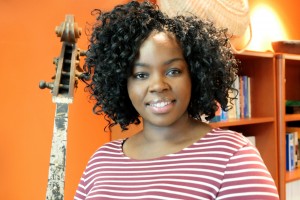A Youth Perspective
I always knew I wanted to help people but I wasn’t sure I knew how to go about doing that. I also always knew I wanted to “change the world,” but let’s be real—lots of people say that! But are they able to really do it? It wasn’t until I had the opportunity to attend Americans for the Arts‘ Nancy Hanks Lecture and hear Norman Lear speak that I started to understand that maybe I can help create change in the world. I began to see how my love for people, my passion for art, and my commitment to peaceful justice might beautifully come together, and I started to believe that I really can do something. The event was an awakening. I call it my “Ah-ha!” moment.
Swanee Hunt’s foundation had hired me to be a youth impresario for ARTWorks for Kids and be part of a team that traveled to share ideas about coalition building, collaborative fundraising, and collective advocacy with youth arts organizations around the country. I was in Baltimore to talk with local youth arts leaders the same week that Americans for the Arts was hosting their National Arts Advocacy Day, which included the Nancy Hanks Lecture. After our presentation ended, my colleague Sara and I jumped on a train into DC and raced to the Kennedy Center to hear the 2015 speaker, Norman Lear. I had heard his name before but had no idea the impact this man had had, both on and off the camera, on our country. That evening, he spoke more truth than I could have ever imagined.
 Norman Lear is an American screenwriter who is responsible for groundbreaking TV shows such as The Jeffersons and All in the Family. For those who have never heard of them, these series pushed the limits of racial barriers and political viewpoints in the 1970s and addressed social issues that no other screenwriters had dared to touch. And Norman Lear did it on national TV with humor, through sitcoms. He was, and continues to be, a social justice and civil rights advocate at the very core of his being. Hearing him speak and gaining a full understanding of what he did for the African-American community moved me beyond words. As a side note: Not only did Common (YES, COMMON!) introduce this man to the stage, but when Lear walked out he was full of life and energy at 93 years old! Unbelievable! Norman Lear is a political activist, philanthropist, author, and family man, and is still a force to be reckoned with in the civil rights and other social justice movements.
Norman Lear is an American screenwriter who is responsible for groundbreaking TV shows such as The Jeffersons and All in the Family. For those who have never heard of them, these series pushed the limits of racial barriers and political viewpoints in the 1970s and addressed social issues that no other screenwriters had dared to touch. And Norman Lear did it on national TV with humor, through sitcoms. He was, and continues to be, a social justice and civil rights advocate at the very core of his being. Hearing him speak and gaining a full understanding of what he did for the African-American community moved me beyond words. As a side note: Not only did Common (YES, COMMON!) introduce this man to the stage, but when Lear walked out he was full of life and energy at 93 years old! Unbelievable! Norman Lear is a political activist, philanthropist, author, and family man, and is still a force to be reckoned with in the civil rights and other social justice movements.
Everything he spoke about that night was so relevant to my life and feels so relevant to the lives of all people of color and other oppressed groups today. When I am his age, I want to be able to say that I made an impact on the lives of young people in ways that moved a generation. He believes this generation has the power to change things, and so do I.
One thing that stood out for me was that he continues to use humor as a source of healing and understanding. We laughed so much at the lecture. Instead of making an already intense or controversial conversation that much more uncomfortable, he cracked jokes, made us chuckle. Or better yet, he made us laugh until we cried—that’s the kind of energy and inspiration that Norman Lear exudes.
The next morning, Sara and I were again on the train, this time headed to Philadelphia for another ARTWorks presentation. We talked about Lear during our trip and it was like a light bulb went off in my head. I started making new connections and asking all these questions: How do political and social systems work? Why are certain beliefs, structures, and practices put into place? How can we change our broken world? What can be done? And what role can art have? I was awakened with a desire to explore and understand. Something ignited.
I am a college student pursuing a public health major with a minor in social justice education. I am also a vocal artist. I had been struggling with navigating what to do with my life and until this moment I had largely seen public health, social justice, and the arts as separate interests. But after hearing Normal Lear, I started wondering what one has to do with other. I began to see the connectedness of my passions and I realized just how important it is for these areas of my life to integrate.
Think about it: Art has the power to heal, restore, uplift, and encourage in the physical, spiritual, and emotional realms. Public health is the study of prevention and well-being. Light bulb! Social justice is the understanding of how systems of oppression operate and how to combat the inequalities and flaws within that system while advocating on behalf of the oppressed group. Light Bulb! Bring all of this together and you have: art heals the hearts of the socially oppressed, causing them to find courage, even in the face of adversity, and to engage and strive to contribute to and live long, prosperous, healthy lives.
I believe we have the power within us to do all of these things. Think about Janelle Monáe, Jidenna, J. Cole, Kendrick Lamar, and all the other artists who use their specific talents to heal, to inspire, to speak the truth of those who may never be heard. I can have that platform. I am going to use it to create change in the world. You, too, know that truth and you have that power. Don’t waste it!
Lessons Learned
- Don’t let one passion go by the wayside just to invest in another. Bring them together—they are connected. Multiple passions can come full circle and help you figure out who you are and what gifts you can share!
- Arts are part of public health, education, social justice, and politics.
- Sitcoms, humor, songs—these things may seem small and powerless, but one voice or one effort can make change! Nothing is “just”. Go for it. Be brave. Don’t limit your dreams.
